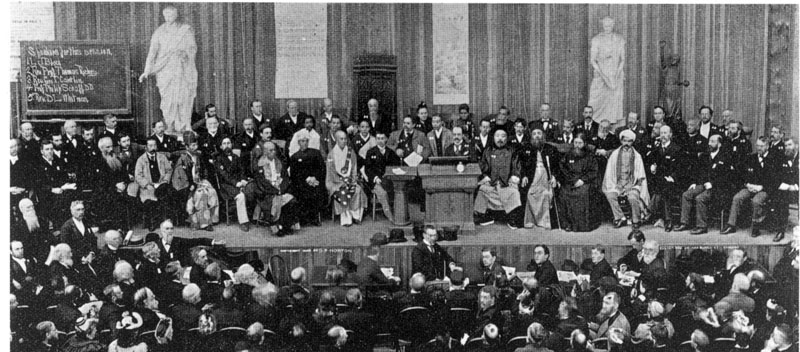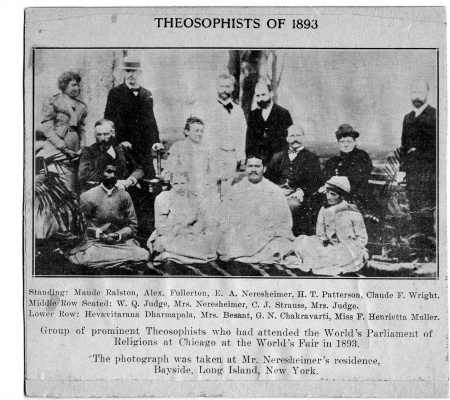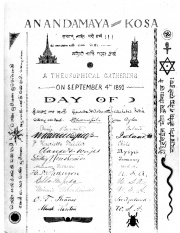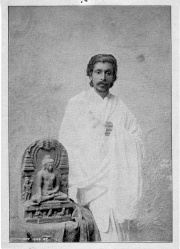World's Parliament of Religions (1893)

The World's Parliament of Religions was an event held September 11-27, 1893, in Chicago, in conjunction with the World Columbian Exposition. It heralded the birth of a worldwide interfaith dialogue that has continued with the Parliament of the World's Religions in 1993, 1999, 2004, and 2007.
Delegates to the Parliament
Henry Steel Olcott, President of the Theosophical Society, wrote about the delegation:
As the World’s Parliament of Religions was to meet at Chicago in the following September, and as it had been arranged that our Society should participate in it, I deputed the Vice-President, Mr. Judge, to represent me officially, and appointed Mrs. Besant special delegate to speak there on behalf of the whole Society. How great a success it was for us and how powerfully it stimulated public interest in our views will be recollected by all our older members. Theosophy was presented most thoroughly both before the whole Parliament, an audience of 3,000 people, and at meetings of our own for the holding of which special halls were kindly given us. A profound impression was created by the discourses of Professor G. N. Chakravarti and Mrs. Besant, who is said to have risen to unusual heights of eloquence, so exhilarating were the influences of the gathering. Besides these who represented our Society especially, Messrs. Vivekananda, V. R. Gandhi, Dharmapala, representatives of the Hindu Vedanta, Jainism, and Buddhism respectively, captivated the public, who had only heard of the Indian people through the malicious reports of interested missionaries, and were now astounded to see before them and hear men who represented the ideal of spirituality and human perfectibility as taught in their respective sacred writings.[1]
Theosophical Program at the Parliament
According to the Supplement to The Theosophist in September, 1893:
The following programme will be carried out on September 15th and 16th next, the two days set aside for Theosophy at the Parliament of Religions at Chicago: -
I. THEOSOPHY DEFINED.
- 1. The theosophical Doctrine of the Unity of all Spiritual Beings.
- 2. The Eternal Unity of Spirit and Matter.
- 3. Theosophy is a System of Truths, discoverable and verifiable by perfected men.
- 4. These Truths are preserved in their purity by the Great Brotherhood of Initiates, the Masters of Wisdom, who promulgate them more and more fully as the evolution of man permits.
II. THEOSOPHY HISTORICALLY CONSIDERED, AS THE UNDERLYING TRUTH OF ALL THE WORLD'S SCRIPTURES, RELIGIONS AND PHILOSOPHIES.
- 1. As found in the Sacred Books of the East and of Egypt.
- 2. As found in the Hebrew Books, and in the New Testament of the Christians.
- 3. As found in Greek and Gnositic Philosophy.
- 4. As found in European Mediaeval Philosophy.
- 5. As found in European Mysticism.
- 6. Esotericism in Religions.
- 7. Links between Religion and Science.
- 8. Revelation not a special property of any one religion.
- 9. The Secret Doctrine and its Guardians.
III. THE PHILOSOPHY AND PSYCHOLOGY OF THEOSOPHY.
- 1. The Cosmos Septenary in its Constitution.
- 2. Man, the Mirror of the Cosmos and Thinker.
- 3. The Inner and the Outer Man.
- 4. States of Consciousness.
- 5. Evolution of the Soul.
- 6. Karma, the Law of Causation, of Justice and Adjustment of Effects.
- 7. Reincarnation of the Soul a Law of Nature.
- 8. The Doctrine of Universal Brotherhood as a fact in Nature.
- 9. The Theosophical View of Death.
- 10. Man, a Sevenfold-Being, thus corresponding to the Cosmos.
IV. THE THEOSOPHICAL MOVEMENT IN ITS ORGANIZED LIFE.
- 1. The Objects of the Theosophical Society.
- 2. Its Relation to Civic Affairs and Education.
- 3. The Mission of the Theosophical Society.
- 4. The Constituted Methods of Administration and Work, the conduct of Branches and their Autonomy; Propaganda.
- 5. The Society absolutely Unsectarian, without a creed, and open to persons of all faiths. Acceptance of doctrines largely taught in Theosophical Literature not incumbent; Universal Brotherhood the only theory required to be embraced.
V. THEOSOPHY AND MODERN SOCIAL PROBLEMS.
- 1. Its insistence on Justice and Unselfishness as the basis of Community Life.
- 2. Its doctrine of Evolutionary Reincarnation as applied to the Sexes.
- 3. Its claim that social evils have their roots in mental faults, and that in addition to legislative, educational, and social improvements, the truths and laws of being must be taught for the fundamental regeneration of society, and the recognitition of Karma and Reincarnation must be made the basis of concerted public, as well as of private, efforts.
VI. THEOSOPHY AND SCIENCE.
- 1. Theosophy hostile to science only when Materialistic, when it repudiates all spheres and processes other than physical, or denies the reality of soul and spirit and the unseen universe.
- 2. Theosophy, as a Universal Philosophy, appropriates all spheres of being and claims a scientific investigation of each.
- 3. The sanction of Right Ethics found in Universal Brotherhood as a fact and not merely a sentiment; enforcement of right ethics found in the power which the knowledge of karma and Reincarnation has on the individual.
- 4. Theosophy offers no new sytsem of right ethics, since right ethics do not vary but are always the same as taught by all great religious teachers.[2]
Report from Annie Besant
Colonel Olcott reported Mrs. Besant's comments to a London newspaper:
The Theosophical Congress, as said one of the leading Chicago papers, was a rival of the Parliament itself in the interest it excited. The plan of the Department of Religion was a good one. Each body strong enough to hold one, had a congress of its own on one or more days, fixed by the committee; in addition to this, chosen speakers occupied one session in presenting the views of their body to the Parliament. The Theosophical Society was given two days for its congress, the evening of the second day being devoted to the presentation of Theosophy before the Parliament. The hall originally granted to it seated about 300 people, but it was so densely packed before the first meeting opened, that the managers gave us another hall seating about 1,200. This was promptly filled, and at each succeeding session the crowds grew, filling passages and packing every inch of room, until at our fifth session two adjoining halls were offered us, and we held two overflow meetings in addition to our regular session. The sixth session was the presentation of Theosophy to the Parliament, and some 3,000 people gathered in a huge hall. So intense was the interest shown that the management most generously offered us the use of the great hall for an additional meeting [37] on the following night, and it was packed with eager listeners. In addition to the Indian and Sinhalese delegates above named, the Theosophical Society sent from its European Section Annie Besant, Miss F. H. Müller, and Mrs. Cooper-Oakley; the American Section was represented by its General Secretary, Wm. Q. Judge, Dr. Jerome Anderson of San Francisco, Mr. George E. Wright and Mrs. Thirds, of Chicago, and Claude F. Wright of New York; the Australasian Branches delegated Mrs. Cooper-Oakley, who had been working among them for ten months, and who came direct from Australia to Chicago. Between the interest excited by the speakers and the far deeper interest excited by the subjects dealt with, the meetings were rendered thus successful.[3]
Theosophists attending the Parliament

assembled before
Parliament

signed by Theosophists
Sept. 4, 1893

Members of the Cincinnati Theosophical Society had an excursion to Chicago on September 15-17, traveling on the Cincinnati, Hamilton and Dayton Railroad at a cost of $7.00 per person. The lodge had a foretaste of the Theosophical Congress on Saturday, September 9, when William Quan Judge, Annie Besant, and Professor Chakravarti made a stop in Cincinnati on their way to Chicago and lectured at the dedication of the new Theosophical Hall. Of the Parliament, Dr. Buck briefly recounted that:
all of the meetings were largely attended and that the platform of the World's Congress of Religions was exactly that of the Theosophical Society in that the latter had for its object the establishment of a nucleus for the Universal Brotherhood of Man and desired to demonstrate the one common basis of all religions."[4]
Frederick J. Kunz and his large family from Freeport, Illinois were in attendance, except for the youngest son, Fritz Kunz, who was only five years old. Afterward, the entire household joined the Theosophical Society and became the mainstay of the Freeport Lodge. Fritz often spoke of his disappointment at missing the trip to Chicago.[5]
Notes
- ↑ Henry S. Olcott. Old Diary Leaves, Fifth Series (1893-1896) (Adyar, Madras, India: Theosophical Publishing House) 35. Available at Theosophical Society in The Philippines.
- ↑ "Theosophy in the Parliament of Religions," Supplement to The Theosophist 14:12 (September, 1893), lxxxix-xc. Available online at Theosopher.net.
- ↑ Henry S. Olcott. Old Diary Leaves, Fifth Series (1893-1896) (Adyar, Madras, India: Theosophical Publishing House) 36-37. Available at Theosophical Society in The Philippines.
- ↑ Minute Book of the Cincinnati Theosophical Society. September 5-19, 1893. Cincinnati Theosophical Society Records. Records Series 20.02.01. Theosophical Society in America Archives.
- ↑ Kunz Family Collection. Records Series 25.01. Theosophical Society in America Archives.
Online resources
Articles
- Theosophical Doctrine by William Q. Judge
- Theosophy Generally Stated by William Q. Judge